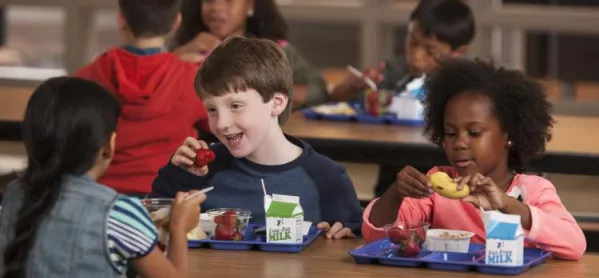The introduction of free lunches for all infants has more than doubled the take-up of school meals, new research shows.
However, it also says almost a third of school leaders (31 per cent) said the introduction of universal infant free school meals (UIFSM) had led to fewer parents registering for free school meals, reducing their school’s pupil premium funding, compared to 15 per cent who said it had increased.
The policy was introduced by the coalition government in 2014.
Today’s report is published by the Education Policy Institute (EPI), whose executive chairman David Laws was a schools minister at the time, and one of its authors Peter Sellen, worked on the policy when he worked at the DfE.
However, the EPI said Mr Laws was not involved in the conduct of the research, while Mr Sellens’ DfE role was to produce objective research and advice.
The report says the take-up of school meals increased from 38 per cent in 2013-14 to 80 per cent in 2015-16, and was higher in small schools and rural schools.
It also finds the policy saved parents an average of 50 minutes, and £10, a week.
‘Clear benefits’
Mary Bousted, joint general secretary of the National Education Union, said the report “clearly shows the benefits that free school meals bring to children and their families when schools are properly funded and supported to deliver them”, and called for free school meals to be extended all primary-aged children.
Last year’s Conservative election manifesto promised to scrap UIFSM, saying: “We do not believe that giving school lunches to all children free of charge for the first three years of primary school - regardless of the income of their parents - is a sensible use of public money.”
But that pledge was abandoned after the Tories lost their Commons majority, and today NASUWT general secretary Chris Keates said it was “essential that the government retains its commitment to it”.
She added: “The report confirms that even the most significant challenges schools have faced were surmountable and that the small number of schools continuing to face difficulties should learn from those that have implemented the policy well.”
The research also says that 39 per cent of teachers thought UIFSM has improved the attainment/progress of pupils, while 36 per cent said it improved their ability to concentrate, with same proportion saying it had improved their ability not to be distracted.
None reported a deterioration.
Good food
Among school leaders, 60 per cent thought there had been no change in overall pupil behaviour, while 19 per cent thought it had improved and 2 per cent thought it had deteriorated.
However, the report did not test statistically for the short term educational, social and health outcomes of the policy.
A Department for Education spokesperson said: “Good nutrition is closely linked to attainment and this report illustrates how our free school meals programme - backed by £600 million funding - is already benefitting 1.4 million children across the country, whilst saving their families hundreds of pounds each year.
“We have supported schools by providing £184.5 million capital funding to upgrade kitchen and dining facilities, as well as giving extra money to help smaller schools provide these meals. This is part of the government’s wider efforts to encourage children of all ages to eat good food that encourages healthy eating for life.”
The report was funded by the Lead Association for Catering in Education.
In a statement, EPI said the research was “conducted objectively and impartially”, and that it “worked with an advisory group including representatives of the school catering industry, school governors, child health and nutrition experts to ensure it was taking a sensible approach, and had full control”.
Want to keep up with the latest education news and opinion? Follow Tes on Twitter and Instagram, and like Tes on Facebook




